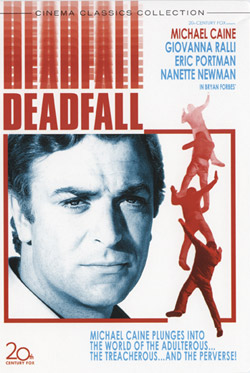

  |
|
|
||||||||||||||||||||||
|
FMS FEATURE... October 23, 2006 Review Deadfall on DVD John Barry's score rediscovered by Jon Burlingame  Deadfall was the last of six collaborations between the composer and director Bryan Forbes, whose dramatic films of the 1960s provided Barry with an entirely different canvas than the James Bond films that had brought him to prominence and which, at the time, were still his claim to fame. Forbes had first asked Barry for a pair of jazz pieces for The L-Shaped Room (1962) and was so impressed that he retained the composer for full scores for Séance on a Wet Afternoon (1964), King Rat (1965), The Wrong Box (1966) and The Whisperers (1967). Séance and Whisperers were wonderfully moody, atmospheric pieces, while King Rat was a major dramatic score and The Wrong Box offered a rare foray into comedy. But for Deadfall, Forbes provided Barry with his greatest scoring challenge to date: Write a guitar concerto to accompany, and in effect underscore, a 15-minute robbery sequence that was without dialogue and, for the most part, sound effects. It was a bold idea. In the film, shot mostly on the Spanish island of Majorca, Michael Caine plays a master burglar and jewel thief; Eric Portman plays an aging safecracker who convinces Caine to join him in an audacious robbery of a nearly impregnable mansion. The owner is attending an orchestra concert when they scale the walls, drug the guard dogs and break into the house. Barry, having read the script and discussed the dramatic needs of the sequence with Forbes, wrote a two-movement piece that he called a "Romance for Guitar and Orchestra." One of Europe's top guitarists, Renata Tarrago, was engaged as soloist, and the London Philharmonic Orchestra was booked to perform the piece, with Barry conducting. Forbes filmed the performance from various angles, then intercut the performance with the scenes of Caine and Portman in action. The handsome Barry made his first appearance before the cameras in the sequence, which begins at about 39 minutes into the film. It's still amazing to watch, and the highlight of Deadfall, a film that was not well-received and not commercially successful at the time. There are plots and subplots here (Portman is gay; his wife, played by Giovanna Ralli, has an affair with Caine; Forbes' wife Nanette Newman plays a beautiful woman who flirts with Caine, etc.) and the results are not especially compelling or satisfying. The film's failure at the box-office undoubtedly cost Barry an Oscar nomination, despite the achievement of the "Romance" sequence, a terrific score and a haunting main-title song sung by Shirley Bassey. (Barry's other major 1968 score, The Lion in Winter, won him the Academy Award anyway.) The film has never looked or sounded so good. Deadfall has only rarely been seen on television; my own video copy was from a 1983 late-night telecast on New York's WOR. A bonus for Barry fans is a 19-minute feature on the DVD entitled "The John Barry Touch: The Music of a Master," which contains new interviews with Barry, director Forbes and Barry biographer Eddi Fiegel (John Barry: A Sixties Theme). The first eight minutes examines Barry's background and early success with the Bond films; the remainder discusses the Forbes films, the shooting of the guitar-concerto and robbery sequences, Shirley Bassey's performance of the theme and Barry's subsequent successes with such films as Midnight Cowboy, Out of Africa and Dances With Wolves. Bassey sings the opening song, "My Love Has Two Faces," which Fiegel correctly describes as "an overlooked Barry classic," with a lyric by Jack Lawrence ("Beyond the Sea," "Tenderly"). Fiegel characterizes the score as "Bond goes to Majorca," but that's a bit simplistic – a good soundbite, but a disservice to the music. Barry's Deadfall score, based on both a love theme (introduced in the Main Title song) and a secondary suspense theme, is as romantic and memorable as any of the Bond scores for which the composer is better known, yet darker and more melancholy in tone. It made for a thrilling soundtrack album, too, one released at the time on Fox's own record label – which became a pricey collector's item – and re-released on CD in 1997. Forbes refers to the "Romance" as "an extraordinary piece of music," and Barry says simply, "it worked very well... gave it a lot of excitement." Understatements both. Deadfall, regardless of its merits as a movie, contains one of the 1960s' most daring attempts to combine classical music and traditional dramatic underscore. For that reason alone, it's worth revisiting. ©2006 Jon Burlingame |
Search
Past Features
Feature Archives
|